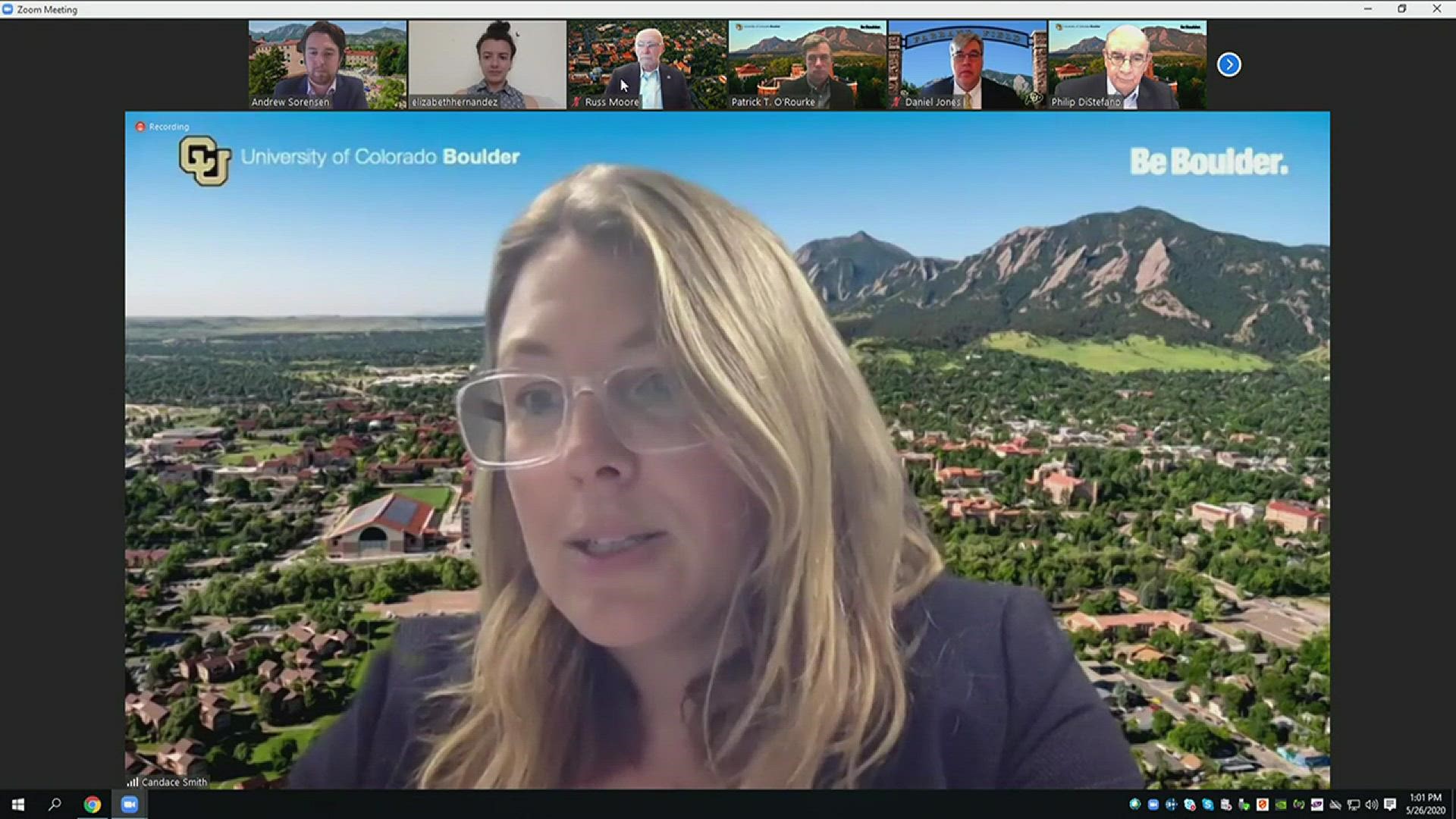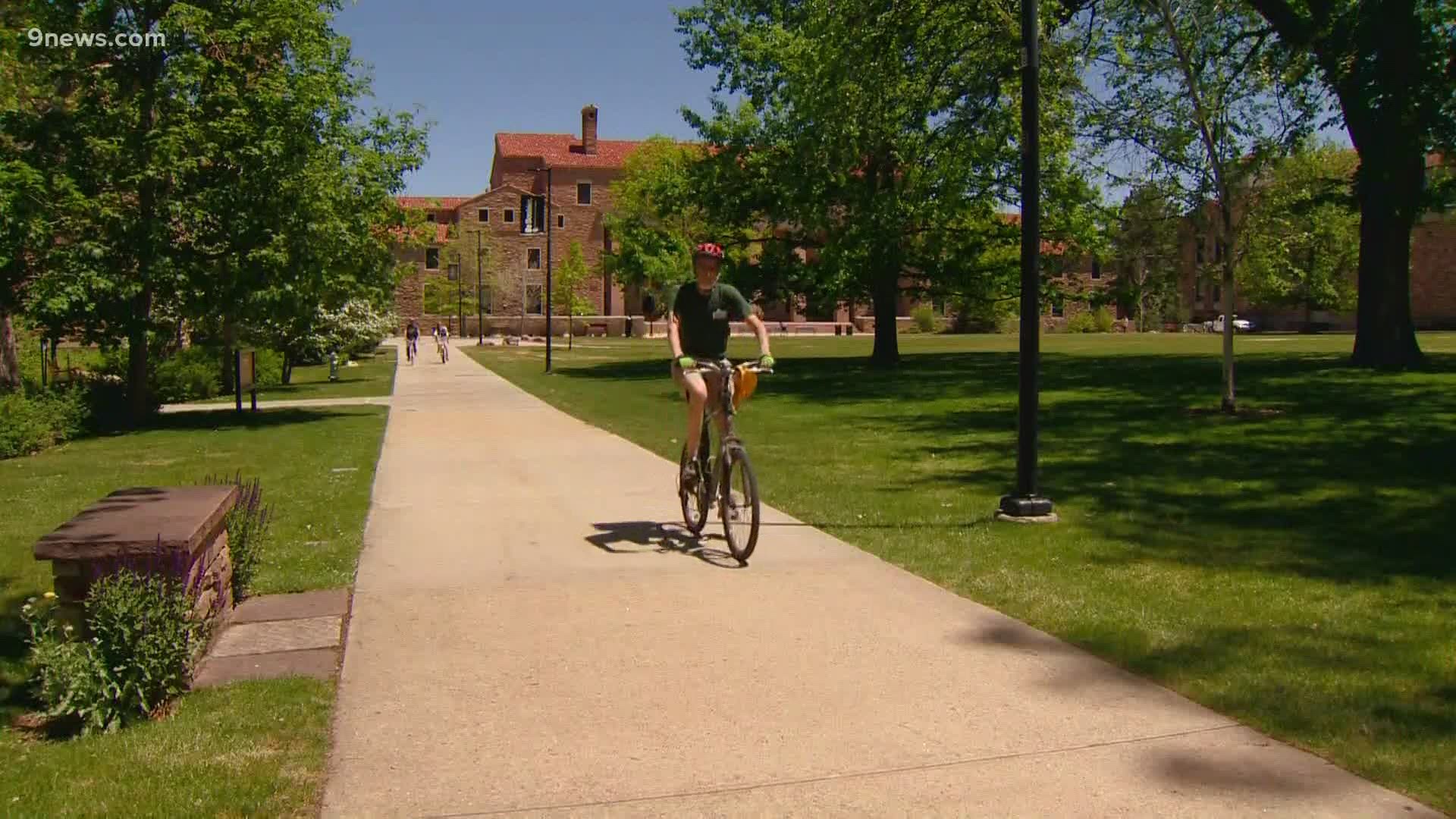BOULDER, Colo. — The University of Colorado (CU) Boulder plans to welcome back students to campus in the fall with many changes, which include a requirement to wear masks and a longer school day to spread out density on the campus, Chancellor Philip P. DiStefano announced Tuesday morning.
DiStefano announced the school's Road Map to Fall 2020 in a letter to all students, faculty and staff after campus leadership’s approval of a final report from the Academic Year 2020-21 Planning Team.
"This is a moment in our history in which our imperatives to lead, innovate and impact humanity are coming together for the future of our university," DiStefano wrote in his letter. "Our vision to be a leader in the humanitarian, social and technological challenges of the 21st century is embodied by all of us right now. Our success is dependent on all of us working together.
"Our challenge as a campus community is to ensure our mission endures. Our mission to serve the public good is more vital now than ever."
The plan, which school officials said was "science-based" yet flexible, has classes beginning as scheduled on Aug. 24 and finishing remotely after Thanksgiving break. It prioritizes health and safety considerations that will be required to minimize risk and enable an on-campus academic model that accommodates both in-person and remote learning.
Since March 16, the university has been holding remote classes, and operations and all events have been canceled through July 31.
A limited number of researchers and critical support staff began returning to campus May 26 to conduct research that can’t be done remotely.
The Road Map to Fall 2020 focuses on three main areas:
- A COVID-19-ready campus experience
- Academic instruction
- Resource alignment.
The plan was developed in consultation with CU Boulder faculty and community epidemiology and public health experts.
They will have protocols and rules in effect with the goal to reduce each person’s potential for infectious contacts by at least 55%. Those measures include the following:
- Requiring masks for all students and employees
- Reducing the density of people from normal operations
- Facilitating small cohorts of students
- Implementing building control measures, such as physical distancing in all campus classrooms and learning spaces
- Implementing an increase in sanitization measures, including ensuring surface hygiene
- Reserving residence hall space for quarantining and isolation.
- Continued remote work arrangements for many employees
- Required risk mitigation plans for each unit seeking approval for personnel to return to campus
- Return-to-work protocols.
School officials said they planned to modify the student code of conduct handbook to include information related to COVID-19 but said any potential punishments for violating those new policies had yet to be determined.
"We want to modify the student code of conduct to reflect that people engaging in activities that endanger people's health will be sanctionable." said CEO Patrick O'Rourke. "We want to begin with education and working with our student population. We would have the ability to approach it from a disciplinary standpoint."
Acknowledging that there will be some risk involved in any model the campus adopts, CU Boulder said its plan aims to mitigate the COVID-19 risks for the community and provide flexibility for the university’s most vulnerable, at-risk populations.
COVID-19-ready campus
The COVID-19-ready campus experience section of the plan provides the ability to adapt operations based on changing local conditions and adherence to state, county and city guidance.
Four modes of campus operation have been established. They include the following:
- Remote (the current campus state)
- Limited (limited physical presence on campus)
- Expanded (fall 2020 in-person operations)
- Full (return to normal operations)
These modes will enable the university to ensure health and safety by notifying the campus community of any changes to operating status based on local COVID-19 conditions throughout the semester.
Among the many mitigation measures outlined in CU Boulder’s plan are:
- On-campus capability for COVID-19 testing of students, faculty and staff, both to continuously monitor for the potential spread and to test individuals with symptoms.
- Campus-based rapid response teams for tracking, notification and isolation of infected individuals.
- Mandatory safety training for on-campus faculty and staff–as well as all students–that includes instruction on physical distancing, wearing of face coverings, hand hygiene and sanitation, and following public health orders on events and public gatherings.
- A public health awareness and outreach program in collaboration with the Boulder Police Department, Boulder County Public Health and student leadership.
- Updated conduct code and related policies to include compliance with COVID-19 public health requirements.
Academic instruction
The academic instruction section of the plan supports the development of flexible options for an in-person academic experience while meeting the needs of students and faculty whose health or personal circumstances require them to teach and learn remotely.
It also provides for environmental safety in classrooms and on campus through physical distancing, class schedule adjustments and other administrative controls.
Key elements of the Academic Instruction section include:
- A regular 16-week semester term beginning on Aug. 24, with the option for faculty to offer some courses, as appropriate, in 8-week sessions during the overall semester
- In-person classes through Wednesday, Nov. 25, with remote teaching after Thanksgiving to allow students to travel home and remain there until the spring semester begins (with exceptions available based on specific needs to remain on campus).
- Implementing a first-year academic experience for all first-year students, including housing assignments and enrolling first-year students in classes with small cohort groups
- Offering courses that provide classes in a variety of in-person, distance and hybrid formats
- Reducing the density of students in classrooms through a suite of methods that includes splitting single classes into multiple sessions and utilizing larger spaces.
- Extending class scheduling to use the entire day, Monday through Friday, 8 a.m. to 9 p.m., to decrease student density on campus.
- Several avenues for supporting the success of returning students, graduate students and instruction.
Resource alignment
The resource alignment section of the plan supports the required investments in health and safety protocols, technology, faculty and staff support, and student success and access. These include:
- Investment in testing, masks, trainings, physical distancing supplies and public health awareness.
- Investment in instructional technology to support student and teaching success.
- Zero tuition increase (approved by the Board of Regents on May 19)
- Waiving the Residential Academic Program fees for all first-year students in residence halls
- Employee support that addresses return-to-work guidance, childcare needs and accommodations for vulnerable populations.
There is flexibility built into the plan so the campus is prepared for a variety of COVID-19 scenarios that could arise. The campus will continue to update and improve the model based on feedback received from the campus community.
SUGGESTED VIDEOS: COVID-19 Coronavirus


